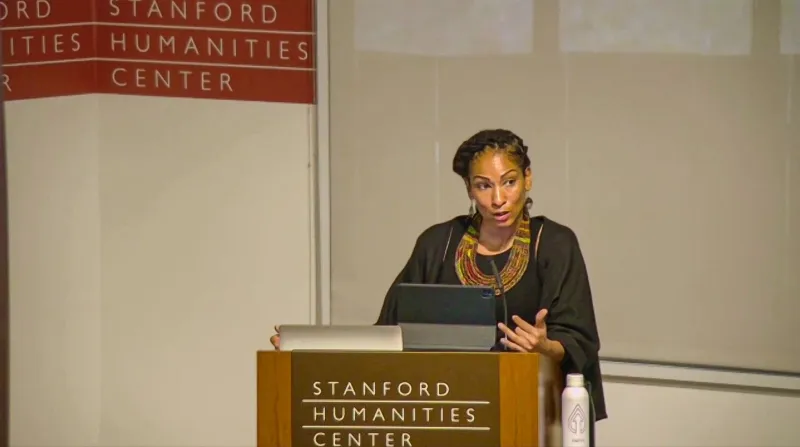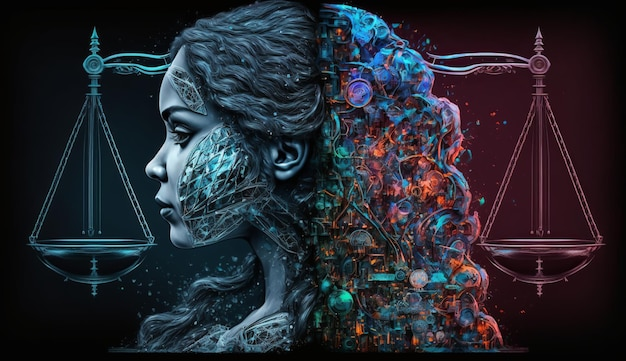Ruha Benjamin’s work on AI and social justice challenges us to envision a future where technology serves humanity rather than undermines it. In her discussions, she passionately argues that the predominant narratives around artificial intelligence often mask self-serving agendas under the guise of altruism. Benjamin, a Princeton sociologist, invites us to reconsider who gets to define the moral implications of technology, positing that current AI solutions disproportionately harm marginalized communities. Highlighting the urgent need for a critical examination of AI ethics, she advocates for a new paradigm that centers social justice in tech. By integrating insights from the arts and humanities, Benjamin encourages us to dare to imagine a better future—one that prioritizes equity and collective well-being over corporate interests in the realm of technology.
The discourse surrounding Ruha Benjamin’s insights on artificial intelligence and equity is redefining our understanding of progressive technology. She emphasizes that the narratives constructed by tech elites often prioritize profit over the well-being of society. Benjamin’s critiques highlight the deep-seated issues of AI ethics, revealing how these innovations can perpetuate injustice instead of alleviating human suffering. By fostering a dialogue infused with creativity and diverse perspectives, she seeks to challenge the status quo and inspire a reimagining of our technological landscape. Ultimately, this conversation extends beyond mere adjustments; it calls for a transformative vision that dismantles existing structures of oppression in favor of a more inclusive future.
Reimagining the Future of Technology
In a world increasingly influenced by artificial intelligence, the potential for a brighter future hinges on our collective imagination and capacity to challenge the status quo. Ruha Benjamin emphasizes the importance of envisioning a radically different future—one that prioritizes human welfare over technological self-interest. As billionaires craft narratives around an AI-driven utopia, we must question their motivations and consider whether their visions truly serve the common good. Instead of simply accepting these narratives, individuals and communities can harness their creativity to redefine how technology intersects with daily life, pushing for innovations that support inclusivity and social equity.
The future of technology doesn’t have to be dystopian; it can be a canvas for vast potential where the needs of all individuals—especially marginalized communities—are prioritized. By reimagining how we use technology through a critical lens, we can develop solutions that not only address current societal challenges but also promote social justice. This requires moving beyond conventional wisdom and embracing bold, imaginative approaches that defy traditional barriers. Emphasizing arts and humanities in this dialogue nourishes diverse perspectives and encourages fresh ideas that are essential in crafting a future that transcends current limitations.
AI Ethics and Social Justice
The ethical implications of artificial intelligence are particularly pronounced in the context of social justice. Ruha Benjamin argues that the faith placed in algorithmic decision-making often overlooks the historical inequities embedded within these technologies. For instance, technologies like facial recognition are not merely neutral tools; they can perpetuate harmful stereotypes and lead to systemic oppression if left unchecked. Therefore, understanding the complexity of these technologies within the broader socio-political landscape is crucial. Critical engagement with AI ethics encourages innovators to create solutions that reflect the values of justice and equity.
Moreover, the conversation about AI ethics must include voices from all walks of life, especially those who are typically marginalized. As Benjamin suggests, technological advancements should not only be entrusted to those with technical know-how but also to individuals grounded in social realities. This multidisciplinary approach ensures that the technologies being developed serve a universal good rather than reflecting the biases of a privileged few. By fostering an inclusive dialogue around AI and ethics, we can fundamentally reshape the landscape of technology, ensuring that it becomes a force for good in society.
The Role of Arts and Humanities in Shaping Technology
Ruha Benjamin’s call for integrating arts and humanities into discussions about technology highlights a critical gap in the current landscape. The arts, rich in cultural insights and human experiences, provide a necessary counterbalance to the cold calculations of algorithms. By engaging with the humanities, technologists and policymakers can better understand the societal implications of their work, leading to innovations that are not only technically proficient but also socially conscious. This integration fosters a richer dialogue that addresses both the technological and human dimensions of development.
Additionally, prioritizing arts and humanities in academic settings can cultivate a new generation of thinkers who appreciate the interconnectedness of technology and society. This approach supports the kind of creative problem-solving that is vital for addressing the complex challenges posed by AI and other emerging technologies. Imagining a better future together—where technology uplifts rather than oppresses—requires the insights that come from artistic expression and critical thought. It is an invitation to envision not just a functioning society, but one where creativity thrives and all individuals feel valued.
Imagining a Better Future Together
As we move forward in an era defined by technological advancement, Ruha Benjamin encourages collective imagination as a powerful tool for change. The notion that we can construct a future that is equitable and just is not only ambitious but necessary. By envisioning a better future, we can fuel movements that challenge existing paradigms and inspire active participation from a diverse range of voices. This creative engagement extends beyond mere critiques of technology to proactive efforts in shaping the realities we wish to inhabit.
The act of imagining an alternative future requires dismantling internalized barriers that tell us what is possible. Engaging with art, culture, and dialogue expands our horizons and empowers us to advocate for systemic change. This collective dreaming, especially when rooted in social justice principles, has the potential to create a society that prioritizes the well-being of all its members. In this way, the future we imagine today can lead to tangible shifts in policy and practice, fostering a more inclusive and compassionate technology landscape.
Critiquing Tech Elitism and Its Impacts
In her lectures, Benjamin critiques the elitist narratives often propagated by tech leaders who frame their ventures as innovations for the greater good. This perspective can obscure the harmful effects of their technologies on marginalized communities. The disconnect between the lives of those who create technology and the realities of those who experience its consequences is stark. By questioning the motivations behind these narratives, we can better understand the need for accountability in the tech industry and advocate for structures that prioritize transparency.
Moreover, addressing the impacts of tech elitism involves recognizing the historical context of technological advancements. Systems that operate on algorithms are not inherently unbiased; they can replicate and exacerbate inequalities present in society. This necessitates a critical examination of who benefits from these innovations and who bears the burdens. By uplifting voices from diverse backgrounds, we can challenge elitist frameworks and work toward developing technologies that serve to empower rather than oppress.
Challenging Algorithmic Decision-Making
The increasing reliance on algorithmic decision-making raises significant ethical concerns, particularly in areas such as healthcare and the criminal justice system. Benjamin highlights how these technologies often reinforce existing biases, ultimately harming those who are already vulnerable. As automated systems decide who receives critical services, the lack of accountability for these algorithms raises alarm bells about fairness and justice. We must critically assess the design and implementation of such technologies to ensure they do not perpetuate systemic oppression.
Engaging with the complexities of algorithmic decision-making requires a multidisciplinary approach that incorporates ethical considerations alongside technological expertise. By fostering dialogue among technologists, ethicists, and social activists, we can develop frameworks that hold these systems accountable. This collaborative effort is essential for crafting algorithms that prioritize transparency, fairness, and social justice. The future of technology should not be dictated by profit motives alone but must reflect a commitment to diverse, equitable, and just outcomes for all.
The Intersection of Creativity and Technology
Benjamin’s advocacy for a blend of creativity and technology speaks to the transformative power of the arts in shaping innovative solutions. By infusing creative thinking into technological development, we open the door to alternative approaches that prioritize human experiences and societal needs. This intersection allows for technology to evolve in ways that resonate on a deeper level, fostering connections between innovation and empathy.
Exploring the relationship between creativity and technology also invites us to question the narratives surrounding progress and modernization. Rather than viewing technology as a purely mechanical endeavor, we can see it as an opportunity to enrich community interactions and cultural expression. Through this lens, technology becomes a tool that can bridge gaps, affirm identities, and empower marginalized voices, supporting a vision of a just and equitable future.
Advocating for a Transformative Vision
Ruha Benjamin’s call for a transformative vision urges us to rethink our current technological trajectory and its alignment with societal values. By advocating for a tech landscape rooted in social justice, we recognize the power of envisioning futures that honor all individuals and prioritize community well-being. This transformative approach compels us to challenge the dystopian narratives often woven into discussions about AI and technology.
As advocates for change, we must not only critique existing systems but also actively work to construct alternatives that reflect our collective aspirations. This involves fostering community-centric innovations and supporting policies that integrate ethical considerations into technological development. By embracing a transformative vision, we can create a reality that not only mitigates harm but also sparks joy, equity, and human flourishing.
Building Inclusive Communities Through Technology
In the quest for a just technological future, the importance of building inclusive communities cannot be overlooked. Benjamin emphasizes that the future we aim for requires more than just technological advancement; it needs active participation from a diverse range of voices. By collaboratively envisioning solutions, communities can challenge existing tech narratives and create pathways that reflect their unique needs and values.
Creating inclusive communities involves recognizing the agency of marginalized groups and empowering them to shape the technologies that affect their lives. This can be achieved by fostering environments where diverse perspectives are welcomed and valued, leading to innovative solutions that uphold justice. By leveraging technology as a means of community empowerment, we can work towards futures that are not only more equitable but also more vibrant and full of possibility.
Frequently Asked Questions
How does Ruha Benjamin link AI to social justice?
Ruha Benjamin emphasizes that AI technologies, often seen as progressive, can perpetuate existing oppressions and injustices. She argues that social justice in tech requires a critical examination of AI’s impacts on marginalized communities, urging that decision-making in AI must incorporate social and historical understanding.
What role do the arts and humanities play in envisioning a better future with AI?
Benjamin advocates for prioritizing the arts and humanities in discussions about AI and social justice. She believes that creativity and critical inquiry can inspire innovative solutions and allow us to reimagine a future that transcends current societal limitations and inequities.
Why does Ruha Benjamin criticize the tech elites in discussions of AI and social justice?
Benjamin criticizes tech elites for framing their AI-driven futures as altruistic while often serving their own self-interests. She highlights that their visions may not align with the collective good, especially when they neglect the voices and experiences of marginalized communities in the design of technology.
What examples does Ruha Benjamin provide to illustrate the harms of AI?
Benjamin cites instances where AI technologies, such as facial recognition and automated triage systems, have caused harm to already marginalized groups. These technologies often reinforce systemic biases and lead to unjust outcomes, illustrating the need for ethical AI development.
How can we address the ethical implications of AI according to Ruha Benjamin?
Benjamin suggests that addressing AI ethics requires a diverse range of knowledge in the development process. She advocates for including voices from various backgrounds, particularly those who have been historically affected by technology, to create a more equitable and just technological landscape.
What is the significance of imagination in discussions of AI and social justice?
Imagination is critical in Ruha Benjamin’s framework as it encourages individuals to envision a radically different and just future. She urges people not just to mitigate harm from existing systems but to creatively redefine what those systems could look like, promoting a transformative approach to technology.
How does Ruha Benjamin propose we reimagine AI technologies?
Benjamin calls for a thorough reassessment of AI technologies, suggesting we go beyond simply making them less harmful. Instead, she encourages us to envision a world that challenges existing power structures, such as borders and surveillance, thus fostering a more equitable future.
What is the connection between AI ethics and social justice in Benjamin’s perspective?
In Benjamin’s view, the connection between AI ethics and social justice lies in recognizing that AI is not neutral. Ethical considerations must prioritize the impact of technology on social inequalities and aim to dismantle systemic injustices rather than perpetuate them.
| Key Point | Details |
|---|---|
| Radical Future Imagination | Ruha Benjamin emphasizes that citizens should not fear envisioning a radically different future for humanity, contrasting this with the self-serving visions of tech billionaires. |
| Skepticism of Tech Elites | Benjamin argues that tech elites cannot be trusted in addressing human suffering, citing their focus on personal survival rather than collective good. |
| AI’s Risks and Inequities | She points out that technologies like facial recognition lead to oppression rather than the promised efficiency, entrenching existing societal inequities. |
| Critique of AI Morality | AI’s supposed neutrality in decision-making can harm marginalized groups, reminiscent of eugenics ideologies, indicating a need for a broader understanding of decision-making frameworks. |
| Call for Diverse Knowledge | Benjamin asserts the importance of including diverse perspectives, particularly in tech creation, to ensure solutions benefit society as a whole. |
| Importance of Arts and Humanities | She advocates for a renewed focus on the arts and humanities in universities to foster creativity and critical thinking. |
| Vision of Radical Change | Benjamin calls for a reimagining of societal systems, encouraging thinkers to envision a world without oppression, borders, and surveillance. |
Summary
Ruha Benjamin AI social justice advocates for a critical reflection on the implications of AI in society, emphasizing that the future can be reimagined beyond current limitations. By challenging the narratives presented by tech elites and calling for a more inclusive discourse involving diverse knowledge systems, Benjamin opens the door to envisioning a future free from systemic oppression. She encourages a focus on creativity and imagination, critical for addressing pressing social issues. Ultimately, her message is a powerful reminder that envisioning a just future requires thinking beyond traditional frameworks and considering the shared, collective good.



